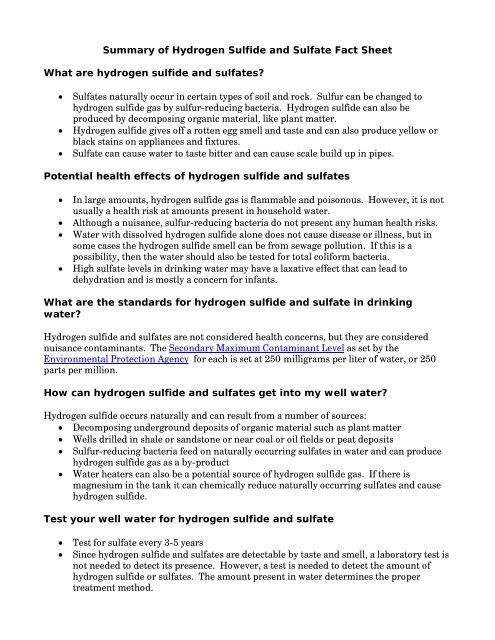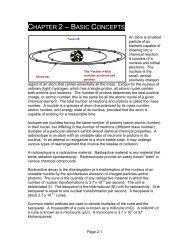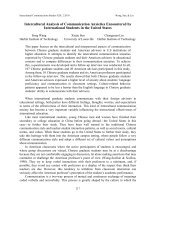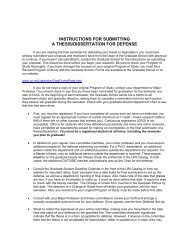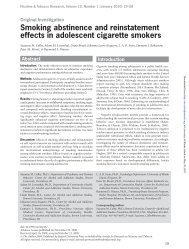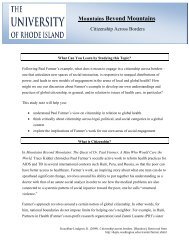Summary of Hydrogen Sulfide and Sulfate Fact Sheet What are ...
Summary of Hydrogen Sulfide and Sulfate Fact Sheet What are ...
Summary of Hydrogen Sulfide and Sulfate Fact Sheet What are ...
Create successful ePaper yourself
Turn your PDF publications into a flip-book with our unique Google optimized e-Paper software.
<strong>Summary</strong> <strong>of</strong> <strong>Hydrogen</strong> <strong>Sulfide</strong> <strong>and</strong> <strong>Sulfate</strong> <strong>Fact</strong> <strong>Sheet</strong><strong>What</strong> <strong>are</strong> hydrogen sulfide <strong>and</strong> sulfates?<strong>Sulfate</strong>s naturally occur in certain types <strong>of</strong> soil <strong>and</strong> rock. Sulfur can be changed tohydrogen sulfide gas by sulfur-reducing bacteria. <strong>Hydrogen</strong> sulfide can also beproduced by decomposing organic material, like plant matter.<strong>Hydrogen</strong> sulfide gives <strong>of</strong>f a rotten egg smell <strong>and</strong> taste <strong>and</strong> can also produce yellow orblack stains on appliances <strong>and</strong> fixtures.<strong>Sulfate</strong> can cause water to taste bitter <strong>and</strong> can cause scale build up in pipes.Potential health effects <strong>of</strong> hydrogen sulfide <strong>and</strong> sulfatesIn large amounts, hydrogen sulfide gas is flammable <strong>and</strong> poisonous. However, it is notusually a health risk at amounts present in household water.Although a nuisance, sulfur-reducing bacteria do not present any human health risks.Water with dissolved hydrogen sulfide alone does not cause disease or illness, but insome cases the hydrogen sulfide smell can be from sewage pollution. If this is apossibility, then the water should also be tested for total coliform bacteria.High sulfate levels in drinking water may have a laxative effect that can lead todehydration <strong>and</strong> is mostly a concern for infants.<strong>What</strong> <strong>are</strong> the st<strong>and</strong>ards for hydrogen sulfide <strong>and</strong> sulfate in drinkingwater?<strong>Hydrogen</strong> sulfide <strong>and</strong> sulfates <strong>are</strong> not considered health concerns, but they <strong>are</strong> considerednuisance contaminants. The Secondary Maximum Contaminant Level as set by theEnvironmental Protection Agency for each is set at 250 milligrams per liter <strong>of</strong> water, or 250parts per million.How can hydrogen sulfide <strong>and</strong> sulfates get into my well water?<strong>Hydrogen</strong> sulfide occurs naturally <strong>and</strong> can result from a number <strong>of</strong> sources: Decomposing underground deposits <strong>of</strong> organic material such as plant matter Wells drilled in shale or s<strong>and</strong>stone or near coal or oil fields or peat deposits Sulfur-reducing bacteria feed on naturally occurring sulfates in water <strong>and</strong> can producehydrogen sulfide gas as a by-product Water heaters can also be a potential source <strong>of</strong> hydrogen sulfide gas. If there ismagnesium in the tank it can chemically reduce naturally occurring sulfates <strong>and</strong> causehydrogen sulfide.Test your well water for hydrogen sulfide <strong>and</strong> sulfateTest for sulfate every 3-5 yearsSince hydrogen sulfide <strong>and</strong> sulfates <strong>are</strong> detectable by taste <strong>and</strong> smell, a laboratory test isnot needed to detect its presence. However, a test is needed to detect the amount <strong>of</strong>hydrogen sulfide or sulfates. The amount present in water determines the propertreatment method.
Have your water tested at a certified laboratory.If hydrogen sulfide <strong>and</strong> sulfates <strong>are</strong> present in my well water, how do Itreat them?Treatment varies with the amount <strong>and</strong> source <strong>of</strong> the hydrogen sulfide <strong>and</strong>/or sulfatedetected. In some cases, a new well may need to be installed. Other treatment optionsinclude:For <strong>Hydrogen</strong> <strong>Sulfide</strong>o Activated carbono Aerationo Iron removal filtero Oxidizing chemicalsFor <strong>Sulfate</strong>s:o Distillationo Reverse osmosiso Ion exchangeFOR THE COMPLETE FACT SHEET ABOUT HYDROGEN SULFIDE AND SULFATESCLICK HERE


